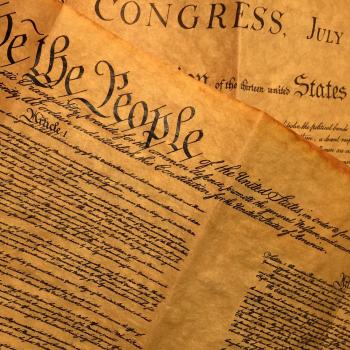
The word Sharī‘ah (which means the “way”—implying the “true way” to live) comes from the root-word, shara‘a, which means to “prescribe” or to “enact.” Sharī‘ah law is the God-given or divinely revealed body of religious laws, given by Allah, and recorded in the Holy Qur’an and (in the minds of most Muslims) in other sacred texts and traditions.
Sharī‘ah law is very complex and volumes have been written on its parameters and application. Thus, our discussion here must necessarily be nothing more than a simple summary—as entire websites have been dedicated to the discussion of the complexity and intricacies of this body of Islamic law.
Definition
One source explains: “Sharia can be thought of as the canonical law of Islam. Functionally it expresses the ethical and moral commitments that regulate the daily lives of Muslims, irrespective of the political realities under which Muslims live.” In short, Sharī‘ah law is the law that governs the religious and family life of most Muslims (e.g., rules for prayer, fasting, marriage and divorce, inheritance, etc.), but not governing societal laws (which Islam accepts should be determined by the leadership of a nation, and its civil courts and magistrates).
Generally speaking, Islam does not seek to draw a distinction between public life and the personal observance of religion—as that bifurcates people into a spiritual part of their existence and a secular part of their life; something Islam sees as inappropriate. Muslims are expected to be the same holy and faithful persons in their public lives as they are in their spiritual, religious, or private lives. That being said, Islamic law is primarily focused on “prescribing” (shara‘a) the personal and family life of the practitioner. It allows the so called “laws of the land” (and the penalties for breaking those) to be determined by civil authorities, not the religion’s authorities. In The Concise Encyclopedia of Islam (p.362), Cyril Glassé pointed out, “Because Islamic law is extremely idealistic in its approach, assuming a natural desire to conform to the truth, and the existence of a ‘holy’ society disposed to religious conformity, there has always existed a parallel system of justice administered by the state.” Thus, while many nation’s laws (including those of the United States) were originally based on religious laws, and while some ultra-conservative or “traditionalist” Muslims may wish the government (of the nation in which they live) would enforce Sharī‘ah law, that is not a mainstream Muslim application of Sharī‘ah law or its purpose. God’s laws are to govern our personal lives and secular laws are to govern secular society; but you and I should always live as spiritual beings with a holy walk even though we dwell in a secularized world.
Gray Areas
Truth be told, even though most Muslims accept the concept of a set of divinely given Islamic canonical laws, there is not full agreement on what constitutes part of that Sharī‘ah law (which God has “prescribed” should be “enacted” among His people). Again, it is generally accepted that the Qur’an is the obvious source for those laws. However, most also see the Ḥadīth (i.e., the “traditions” or “story,” the sayings and doings of Muhammed) as necessarily a source of Sharī‘ah law. Of course, one might ask, Which version of the Ḥadīth?—the Sunni or the Shia? And all of the Hadīth? Or just the sahih (i.e., “authentic”) Ḥadīth? What of the dhaif (i.e., “weak”) Ḥadīth, or the maudhu (i.e., “fabricated”) Ḥadīth? And what of the principle of ijtihād, which is the extrapolation of Sharī‘ah law from the various passages of the Qur’an, the Ḥadīth, or the Sunnah (i.e., the “habitual” or “traditional practices” of Islam)? Are those extrapolations (or “analogies”) also the equivalent of “law” for faithful Muslims? Not all will agree on these questions and, thus, the specific details as to what constitutes Sharī‘ah law is a matter of debate in the various Islamic denominations, and their subsets.
Degree of Obligation
Another thing which must be considered is the fact that, even if something is recognized as part of Sharī‘ah law, there are still categories of the severity or necessity of following a given law. So, one may say “Yes, this is part of Sharī‘ah law,” but one must then ask, Is that rule “obligatory” (farḍ) under the law? Or is it recommended, but non-obligatory (mustaḥabb)? It could possibly be a totally neutral law (mubāḥ). Or perhaps it is not forbidden, but strongly discouraged (makrūh). Or, under Sharī‘ah law, it might outright be forbidden (ḥarām)? These questions complicate the matter when analyzing what is part of Sharī‘ah law and how obligatory that law is on the practitioner of Islam.
Enforcement
It has been pointed out that “Most believers have the freedom to apply sharia according to their circumstances, and sharia is not commonly used as the source of legal code in most Muslim nations.” Similarly, in The Concise Encyclopedia of Islam (p.362) it states:
“Nowhere today, with the exception of Saudi Arabia and some Gulf states, is sharī‘ah law the dominant legal system. In some countries it has been replaced entirely by legal systems copied from European countries; in others it has been relegated to deciding cases of family law; and in others it exists side by side with European legal systems… In addition, sharī‘ah law is, in practice, traditionally limited by the customary laws of people who adopt [or accept] Islam.”
The point is, even in predominantly Islamic countries, Sharī‘ah law is not supposed to be forced upon the people—including upon non-Muslims. “The vast majority of Muslims in the world reject the imposition of sharia on non-Muslim cultures, countries, and citizenries.” Living Sharī‘ah law is supposed to be a choice because one is a believer and loves God and His ways. Force makes obedience meaningless—whether you are a Muslim or non-Muslim—because the compliance is not sincere, and God knows and judges the heart, not simply outward acts.
There have certainly been nations with leaders or nationals who have sought to blur the lines between civil and Sharī‘ah law, and whose goal was to make it the “law of the land.” However, this is contrary to Islamic teachings and very different from what most Muslims believe. (Of course, Westerners must be careful about confusing cultural practices and isolated incidents with actual Sharī‘ah law and its requirements and implementation. Those are frequently confused, and false assumptions are drawn about Islam and its practices as a consequence.)
We conclude our discussion about enforcement with a final quotation from The Concise Encyclopedia of Islam (p.362-363):
“The desire to return to a more religious society…and the rise of modern fundamentalism…have obliged many governments to make gestures of ‘a return to Islamic law’. These have taken the form of superficial, symbolic, and sporadic applications of the more rigorous aspects of such punishments as public flogging in order to play up to popular sentiments. However, to return to sharī‘ah law would symbolize the return to an age of faith, and that is entirely beyond the capacities of modern peoples as a whole, and still less of their governments…
The application of sharī‘ah law exclusively and in its totality is not possible today…; it cannot be, unless the world itself were to return to another age. And this is not feasible for whole societies without changes of cosmic proportions which are out of human hands, whatever may be possible for individuals.”
In essence, Muslims see Sharī‘ah law as God’s law, and obedience to it as something only you or I can choose, but that no one can validly force upon us. Acceptance and adherence to this divine set of laws is an “outward expression of an inner commitment” to follow Allah and His ways—and, ultimately, such submission or surrender to God’s will opens the door for His grace to be poured out—securing a place in paradise for those who are faithful.
3/10/2023 5:16:14 PM










